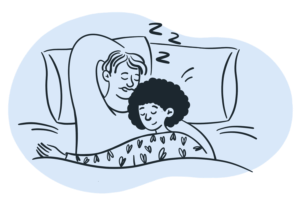Sleep FAQs
Disclosure: By clicking on the product links in this article, Mattress Nerd may receive a commission fee at no cost to you, the reader. Read full disclosure statement.
Sleep is vital for the body and mind to function correctly. Poor sleep can lead to many mental, physical, and emotional health concerns that range from minor to severe.
We’re breaking down some of the most common questions surrounding sleep to help you get your best rest.
How Much Sleep Do You Need?
The amount of sleep you need changes as your age. This is what the Centers for Disease Control and Prevention (CDC) suggests:
| Age | Hours of sleep per day |
| 0–3 months | 14–17 hours |
| 4–12 months | 12–16 hours |
| 1–2 years | 11–14 hours |
| 3–5 years | 10–13 hours |
| 5–12 years | 9–12 hours |
| 13–18 years | 8–10 hours |
| 8–60 years | 7 or more hours |
| 61–64 years | 7–9 hours |
| 65 and older | 7–8 hours |
Keep in mind that sleep quality is also important. Even if you’re in bed for seven hours, you might not wake up feeling rested if you tossed and turned throughout the night.
What Happens if You Don’t Get Enough Sleep?
About 1 in 3 adults in the United States don’t get enough sleep every day, according to the National Institutes of Health. The organization also estimates that 50 to 70 million Americans have a chronic sleep disorder.
In most cases, occasional bad sleep isn’t a cause for concern. But even then, it can still interfere with your daily life. Poor sleep can make you feel anxious, cranky, or frustrated. This can impact the relationships you have with yourself and others.
Sleep deprivation can also make it difficult to pay attention, retain information, and keep your cool in stressful situations.
If sleep deficiency becomes chronic, it can lead to health conditions such as:
According to the CDC, sleep deprivation can have similar effects as alcohol intoxication. In fact, being awake for 17 hours can have the same effects as a blood alcohol concentration (BAC) of 0.05% which can lead to poorer coordination and concentration. Worse yet, being awake for a full 24 hours has a similar effect as a BAC of 0.10%. This is above the drunk driving level of 0.08% in the United States.
That said, don’t operate heavy machinery or do any potentially risky physical exercises when you’re sleep deprived. It can significantly increase the risk of car accidents, falling, or other accidents.
How Can You Improve Your Sleep?
Whether you have a sleep disorder, are switching to a new work schedule, or just want to feel more rested, there are lots of effective ways to improve your sleep.
Here are seven tips to help you get better quality rest.
1. Stick to a Consistent Sleep Schedule
Try to keep your sleep schedule as consistent as possible. That means going to bed and getting up at the same time each day, even on your days off. This pattern reinforces your body’s sleep-wake cycle. Over time, this can make falling asleep and waking up easier.
2. Add More Exercise to Your Day
Exercise during the day can help you rest better at night. Even 30 minutes of moderate cardio can help you feel a difference in sleep quality the same night. Working out is also a great way to boost your mood, decrease stress, and reduce the risk of various health concerns.
Just be sure to avoid anything super strenuous at night. Doing a cardio-centric or strength-training workout 2 to 3 hours before bedtime might make it harder to unwind and fall asleep. But on the other hand, some folks find it relaxing to do some light stretching or gentle yoga poses.
3. Watch What You Eat and Drink
Feeling very full or hungry can make it harder to fall asleep. So, while you should avoid large meals right before bed, it might be helpful to eat a light snack around bedtime.
You should also avoid caffeinated drinks like coffee, soda, tea, and energy drinks at least eight hours before bed. It’s also a good idea to avoid alcohol before bed. It might help you fall asleep faster, but it can make it difficult to get a quality night’s rest.
4. Keep Your Bedroom Cool and Comfortable
The ideal sleeping environment is cool, dark, and quiet. Here are some tips:
- Cool. The ideal sleep temperature for adults is between 60–67°Farenheit (16–21°Celcius) for most adults. To achieve this, keep your heat on a low setting in the winter, and use an air conditioning unit or strong fan in the summer. You can also opt for cooling blankets and lightweight pajamas.
- Dark. Blackout curtains and a sleep mask can keep things dark even during daylight hours.
- Quiet. If you live in a busy area, noise-canceling headphones can really come in clutch. You can also use white noise to block out annoying outside sounds.
5. Try Some Relaxation Techniques
A little mindfulness can go a long way. Try a relaxing activity before bed. Some great options include:
- journaling
- guided meditation
- breathing exercises
- transcendental meditation
- reading a book for 20 minutes
- 10 minutes of gentle stretching
- Listening to calming music as you get ready for bed
6. Reduce Daytime Naps
Quick naps are a great way to boost energy, reset the mind, and decrease stress. Just try to limit your naps to 30 minutes or less. Long naps, or naps taken later in the day, can make it very difficult to fall asleep. They can also throw a wrench in your sleep-wake cycle.
7. Try a Sleep Supplement
Sleep supplements also might be able to help you fall asleep, stay asleep, and wake up refreshed. Some popular options include:
- Glycine
- Lavender
- Melatonin
- L-theanine
- Magnesium
- Valerian root
- Ginkgo biloba
Just be sure to talk to your doctor before adding any supplements to your daily routine. Also, be careful which brands you buy from. Stick to trusted products that have been third-party tested for quality.
What Are the Sleep Stages?
There are four main phases of sleep. A full cycle lasts around 90 to 110 minutes and repeats throughout the night. Here’s what happens.
Stage 1: NREM
This is the transition period between being awake and being asleep. It usually lasts around 5 to 10 minutes.
Non-rapid eye movement (NREM) sleep accounts for about 80 percent of total sleep, while rapid eye movement (REM) sleep makes up the remaining 20 percent.
Stage 2: NREM
Stage 2 lasts about 10 to 25 minutes. During this time, your brain starts producing sleep spindles – a brain wave pattern that occurs during non-rapid eye movement sleep. Your body temperature drops, and your heart rate slows down.
Stage 3: NREM
Stage 3 is also known as deep sleep, delta sleep, and slow-wave sleep (SWS). It lasts 20 to 40 minutes, making it the longest phase of the sleep cycle.
During deep sleep, your breathing and brain activity slow down. Your brain produces delta waves which are associated with the deepest levels of relaxation and restoration. Studies suggest deep sleep promotes insightful thinking, memory, and creativity.
Your body also uses this time to repair tissues and secret hormones that bolster bone and muscle growth.
Stage 4: REM Sleep
REM occurs about 90 minutes after you fall asleep. During this stage, your brain lights up with activity, your eyes move rapidly, and your breathing becomes fast and irregular. It’s also the stage where your body is temporarily paralyzed and you have dreams.
What’s Your Circadian Rhythm?
Your circadian rhythms are behavioral, mental, and physical changes that follow a 24-hour cycle. You can think of it like your internal or biological clock. It plays a major role in healthy sleep and also has an impact on hormones, eating habits, digestion, and body temperature.
Your body utilizes multiple circadian rhythms that are synchronized by a “master clock” in your brain. This master clock is heavily influenced by your environment, especially light and dark.
Why Do You Dream?
Experts are still trying to determine why you dream. But, most sleep scientists agree that dreams have a variety of important functions.
Studies show that certain dreams are universal and can symbolize subconscious thoughts or emotions. Common themes include:
- flying
- falling
- running late
- being chased
- being in an accident
These dreams can help prepare people for real-life challenges or dangerous situations.
Additionally, researchers believe dreams also help:
- Foster creativity
- Process emotions
- Nurture the fight-or-flight response
- Purge unnecessary memories and information
Even nightmares can serve a purpose. Remember, dreams help you process all emotions, not just positive ones. So, nightmares might help you overcome traumatic memories or subconscious fears.
If you’re struggling with nightmares – or if your dreams interfere with your sleep quality – chat with your doctor. They can help you get to the bottom of the problem, and offer solutions for your unique situation.
What Temperature Should You Keep Your Bedroom?
The exact ideal temperature for sleep depends on a person’s age:
| Age Group | Temperature, (°Farenheit) | Temperature, (°Celcius) |
| Infants/Children | 65–70° | 16–21° |
| Adults | 60–67° | 15–19° |
| Seniors | 66–70° | 19–21° |
Why so cool? Well, generally, cooler temperatures are optimal for comfortable sleep. You might have a harder time getting comfortable when you’re too hot.
Additionally, your circadian rhythm regulates your core body temperature. Your body temp rises during the day and lowers around bedtime. So a cool room can be a cue that it’s time to rest.
Will Taking Naps Disrupt Your Sleep Schedule?
Long or frequent naps can interfere with sleep. But there are some ways you can nap without messing up your nighttime rest. Here are some tips:
- Keep it short. Napping for 30 minutes or less can help you feel refreshed without impacting your nighttime sleep.
- Nap earlier in the day. Napping in the evening – even for a short while – can make it harder to fall asleep at bedtime.
- Get comfortable. Try to nap in a restful environment with low light and a comfortable temperature. This can help you fall asleep faster and reap more benefits from your naps.
How Does Your Sleep Change as You Age?
Sleep patterns change as you age. Most folks find it harder to fall asleep as they age. Older adults may also wake up more during the night than children. According to the National Library of Medicine, older people wake up three or four times a night on average.
Additionally, older people often see a decreased amount of sleep each night. Also, the transition between being asleep and waking up is often sudden. This can leave someone feeling like they’re a lighter sleeper than when they were a younger adult or child.
Source List
Aging Changes in Sleep. (n.d.). https://medlineplus.gov/ency/article/004018.htm
Brinkman JE, et al. (2022). Physiology of Sleep. https://www.ncbi.nlm.nih.gov/books/NBK482512/
Circadian Rhythms. (n.d.). https://nigms.nih.gov/education/fact-sheets/Pages/circadian-rhythms.aspx#
Exercising for Better Sleep. (2023). https://www.hopkinsmedicine.org/health/wellness-and-prevention/exercising-for-better-sleep#
How Much Sleep Do I Need? (2022). https://www.cdc.gov/sleep/about_sleep/how_much_sleep.html
Risks from Not Getting Enough Sleep: Impaired Performance. (2020). https://www.cdc.gov/niosh/emres/longhourstraining/impaired.html
What Are Sleep Deprivation and Deficiency? (2022). https://www.nhlbi.nih.gov/health/sleep-deprivation
Wing EJ, et al. (2022). Cardiac Arrhythmias. https://www.sciencedirect.com/topics/neuroscience/delta-wave
Yordanova J, et al. (2010). Differential Associations of Early- and Late-Night Sleep With Functional Brain States Promoting Insight to Abstract Task Regularity. https://pubmed.ncbi.nlm.nih.gov/20195475/


